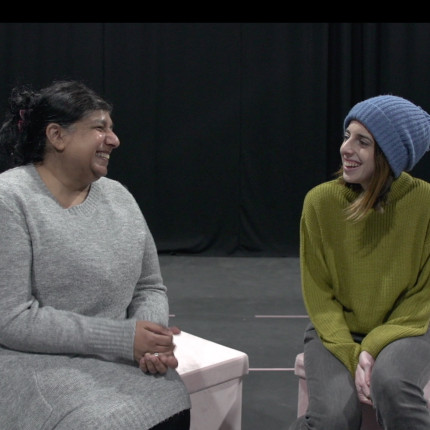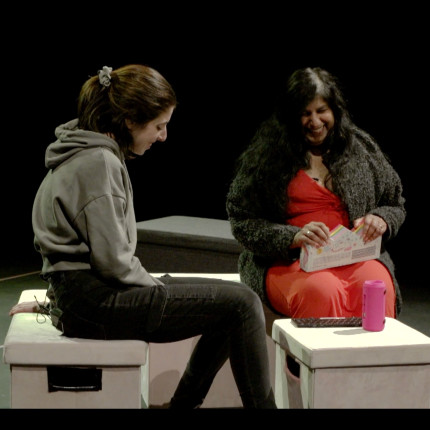Relationships can be complicated — especially relationships between people with visual impairment and those employed to support them.
A new play explores one of these complex relationships. Kirin Saeed, who is registered blind, wrote the play with her care worker, Sara.
The duo first performed the play, “Crossing Care”, at a North Edinburgh theatre in early October. Kirin has since been submitting the play to performing arts and disability festivals for consideration.
“The play is about a year in the life of both of us: from when Sara started working with me until when she moved on to another job,” Kirin said.
“It illustrates the many issues people and their support workers have, in my case, as a person with a visual impairment.”
Kirin works as a Braille Proof Reader at the Scottish Braille Press. She said she appreciated the work and efforts of support workers, even though the relationships formed were unusual.
“For many people with visual impairment and for lots of disabled people, what often occurs in our lives is: we meet and have intense relationships with people who are either supporting us in securing benefits, enabling us to have confidence doing something, or doing rehabilitation work with us,” Kirin said.
“That relationship is really intense, but then it ends abruptly and we have to move on. Then we have to learn new things, with a new support person.”
“That relationship is really intense, but then it ends abruptly and we have to move on. Then we have to learn new things, with a new support person.”

"We can teach people the whole process we used, from writing to performing, and everything in between.”
The play highlights the difficulties that occur when disagreements arise between a support worker and a supported person.
“One of the scenes shows the role a worker has in enabling social situations to be more positive and interactive. Another scene illustrates those moments of crisis, when both parties have to make decisions that cross over the grey barrier between employer and employee.
“Then there’s that final moment, when everything settles and there are positive outcomes — but then the worker has to leave. The whole cycle starts over again.”
Kirin hopes her experience can help more plays featuring blind and partially sighted actors come to stages.
“We’re intending to share our experience with playwrights and directors as a training opportunity on how to work with someone who’s visually impaired. We can teach people the whole process we used, from writing to performing, and everything in between.”
Kirin said she hoped more people with visual impairment would become involved in theatre.
“I wanted to tell my story and then open the door to other people to tell their stories. I want to show visually impaired people that they can do this too,” she said.

Read more stories from Sight Scotland in our latest iSight magazine, featured below.
Subscribe to the iSight magazine
You'll receive all the best stories from Sight Scotland in the seasonal iSight magazine. We publish three issues each year.
Click below to visit the Contact Us page, then tick the box at the bottom to enter your address details.
You may also be interested in
Information, Advice and Resources
Whether you're looking for guidance for yourself, or want to know more about how to support someone with sight loss or blindness, we are here to help.